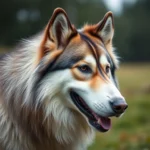
Introduction
When it comes to dogs, intelligence can be a hotly debated topic. Some breeds are lauded for their exceptional trainability and problem-solving abilities, while others are often labeled as the dumbest dog breeds. But what does it truly mean to be a “dumb” dog? This article aims to demystify the concept of canine intelligence, explore the criteria for determining a dog’s perceived intelligence, and highlight some of the breeds that often fall into the “dumb” category.
Understanding the varying traits of different breeds is essential for potential dog owners. It helps in making informed decisions about which breed may fit best with your lifestyle. For this reason, we will delve into the world of canine intelligence, revealing the so-called dumbest dog breeds and highlighting the unique characteristics that may contribute to their ranking.
Understanding Canine Intelligence
What is Canine Intelligence?
Canine intelligence is a broad concept that encompasses various types of cognitive abilities in dogs. It can be broken down into three main categories:
-
Instinctive Intelligence: This refers to the innate skills a dog possesses, such as herding, guarding, or hunting. Different breeds were developed for specific tasks, and their instinctive abilities can vary widely.
-
Adaptive Intelligence: This measures how well a dog can solve problems, learn from experiences, and adapt to new situations. Adaptive intelligence can often be seen in everyday scenarios where dogs navigate their environments.
-
Working Intelligence: This type refers to a dog’s ability to learn commands and perform tasks as instructed by their human companions. It is often the most commonly assessed form of intelligence in dog training.
Factors Influencing Dog Intelligence
Several factors contribute to a dog’s intelligence, including:
-
Genetics and Breeding: Certain breeds are genetically predisposed to higher intelligence levels. For instance, Border Collies are known for their exceptional working intelligence due to selective breeding for herding tasks.
-
Training and Socialization: A dog’s exposure to training and socialization plays a significant role in its intellectual development. Dogs that receive consistent training and positive reinforcement tend to show higher levels of adaptive intelligence.
-
Environment and Upbringing: The environment in which a dog is raised can impact its behavior and intelligence. A stimulating environment with ample interaction and mental challenges can enhance a dog’s cognitive abilities.
Common Myths About Dog Intelligence
It’s important to dispel some common myths about dog intelligence. One prevalent stereotype is that certain breeds, often labeled as the dumbest dog breeds, are inherently less affectionate or loyal. This is not the case. Intelligence does not correlate with the capacity for love or loyalty. Many dogs considered less intelligent are incredibly devoted companions.
Criteria for Ranking Dog Breeds
Historical Context of Dog Intelligence Rankings
The ranking of dog intelligence has a historical context, often shaped by studies and surveys. One of the most notable researchers in this field is Stanley Coren, a professor emeritus of psychology at the University of British Columbia. His book “The Intelligence of Dogs” categorizes breeds based on their working and obedience intelligence, providing a framework for understanding which breeds might be considered “dumb.”
Metrics Used to Evaluate Dog Intelligence
When assessing dog intelligence, several metrics are typically used:
-
Obedience and Working Intelligence: This includes how quickly a dog can learn commands and how well they respond to training.
-
Ability to Learn Commands: The speed and efficiency with which a dog learns new commands are crucial indicators of intelligence.
-
Problem-Solving Skills: Dogs that display a knack for figuring out puzzles or obstacles are often considered more intelligent.
The Dumbest Dog Breeds
Overview of Breeds Considered “Dumb”
While the term “dumb” may seem harsh, it’s essential to understand that this label does not imply a lack of affection or loyalty. Many of the dumbest dog breeds are loving companions that bring joy to their owners. Here, we will explore some breeds often included in this category.
Detailed Profiles of Each Breed
Afghan Hound
Characteristics and Temperament: The Afghan Hound is known for its elegant appearance and independent personality. This breed often exhibits a calm demeanor, but its aloofness can be mistaken for a lack of intelligence.
Reasons for Ranking Low in Intelligence: Afghan Hounds have a reputation for being stubborn and less responsive to training, contributing to their ranking among the dumbest dog breeds.
Basenji
Unique Traits and Behavior: The Basenji is often referred to as the “barkless dog” due to its unique vocalizations. This breed is known for its alertness and keen hunting instincts.
Explanation of Intelligence Perception: Basenjis can be challenging to train because they tend to follow their instincts rather than commands, leading some to perceive them as less intelligent.
Bulldog
Overview of Personality and Training Challenges: Bulldogs are renowned for their loose, wrinkled skin and gentle disposition. Their laid-back nature makes them endearing but can also make training a challenge.
Discussion of Breed-Specific Characteristics: The Bulldog’s stubbornness and short attention span contribute to its reputation as one of the dumbest dog breeds.
Chow Chow
Description and Common Misconceptions: Chow Chows are known for their lion-like appearance and aloof attitude. They are often reserved and may not always seek human interaction.
Intelligence Factors Affecting This Breed: Chow Chows tend to be less responsive to training, which can lead to misunderstandings about their intelligence level.
Borzoi
Characteristics and Their Impact on Training: The Borzoi, or Russian Wolfhound, is known for its grace and speed. However, their independent nature can make them difficult to train.
Reasons for Lower Intelligence Ranking: Their tendency to act on instinct rather than commands contributes to their lower ranking in intelligence.
Basset Hound
Overview of Temperament and Training Challenges: Basset Hounds are characterized by their long ears and droopy expressions. They are gentle and affectionate but are often seen as stubborn.
Factors Contributing to Perceived “Dumbness”: Their slow learning curve and laid-back approach to training often lead to misconceptions about their intelligence.
Pekingese
Unique Personality Traits: Pekingese dogs are small, proud, and often have a regal demeanor. They are affectionate and loyal companions.
Discussion on Adaptability and Intelligence: While they may be challenging to train, their strong personalities and adaptability make them cherished pets.
St. Bernard
Overview of Temperament and Intelligence Perception: St. Bernards are known for their gentle nature and large size. Despite their history as rescue dogs, they can be a bit slow to learn commands.
Factors Influencing Training Effectiveness: Their laid-back attitude and calm demeanor can lead to perceptions of low intelligence, though they are incredibly affectionate.
The Value of “Dumb” Dogs
Affectionate Companions
Despite their ranking among the dumbest dog breeds, these dogs often possess an abundance of affection and loyalty. Many owners of these breeds share heartwarming stories of their pets’ loving nature and unwavering companionship.
Low Maintenance and Adaptability
Breeds that are considered less intelligent may actually offer unique benefits for potential owners. Many of these dogs are low maintenance and adapt well to various living situations, making them ideal for families or individuals who prefer a relaxed lifestyle.
Fostering Connection and Understanding
Owning a dog labeled as “dumb” requires a different approach to training and bonding. Patience and understanding can foster a deep connection, allowing owners to appreciate the unique qualities of their pets. Building strong bonds with these dogs often leads to fulfilling relationships that transcend traditional measures of intelligence.
Conclusion
In this exploration of the dumbest dog breeds, we’ve uncovered the complexities surrounding canine intelligence. While certain breeds may rank lower on intelligence scales, it’s essential to look beyond these metrics when choosing a companion. Each dog has its unique charm and character, regardless of its perceived intelligence. The joy of owning a dog lies not in its ability to perform tricks but in the love and companionship it brings to our lives. Whether smart or “dumb,” every dog has a special place in our hearts.









